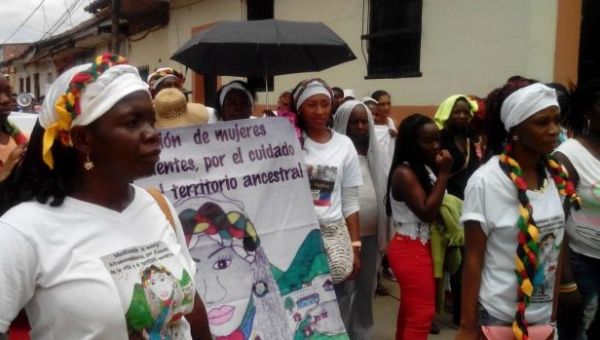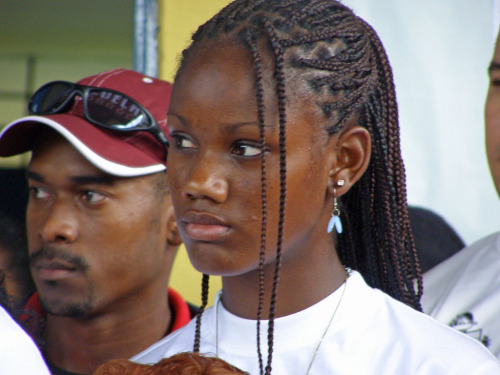
Afro-Colombians
Afro-Colombians are strong people. They are our Brothers and our Sisters from the nation of Colombia. For centuries, they have fought for justice, freedom, and equality. In our generation, Afro-Colombians are still fighting the good fight. They have the second largest black population in South America. They live in regions like Choco, Buenaventura, Cali, Cartagena, San Andres Island, and throughout the nation too. Black people in Colombia are diverse. Some are influenced by Caribbean cultures. Today, Afro-Colombians are called Afro-Colombiano and La Comuniado Negras (or the black community) in Colombia. Back during the 1520’s, African slaves came into Colombia as domestics and agricultural workers. Slaves were mainly used in mining in the 1560’s which was common in Latin America. Some slaves saved money and purchased their freedom. Some of their owners freed them. In 1530, there was the slave revolt in Santa Maria, Colombia where black people wanted to be free from tyranny. Benkos Bioho founded Palengue de San Basilio in 1603. The 1691 decree granted freedom to palenques of Sierra de Maria. By the 1770’s, about 60% of Colombia was made up of free people of color. Runaway slaves formed guarded villages called palenques. Many freed slaves continued to work in their communities. Colombia was independent from the Spanish Empire by 1819. This was caused by Simon Bolivar. Bolivar used black people, zambos (or a biracial person of black African and Native American descent), and biracial people for his independence army as never truly viewed these human beings as equal human beings. He feared slave revolts more than the Spanish invasion. This was during the time where nationalist sentiments were found in Haiti, Latin America, Mexico, South America, France, etc. After Colombia’s independence, civil wars came about over slavery and other political issues. On May 21, 1851, Colombia abolished slavery. By 1852, Afrodescendants in Colombia had 21.1 percent of the population. Afro-Colombians were discriminated against and many were barred from voting and other economic opportunities. Beginning in the 1920s, the government of Colombia pursued a racist policy of whitening (or trying to eliminate people of black African descent in Colombia). Like most of Latin America, this was viewed in economic/biological terms. In 1922, Law 114 was passed banning immigration of people deemed "inconvenient" for the development of the Colombian race and nation. This law encouraged white immigration. Law 114 was the manifest of ideas and sentiments expressed by later president Laureano Gomez in 1928, who stated, "The black is a plague. In the countries where he has disappeared, as in Argentina, Chile, and Paraguay, it has been possible to establish an economic and political organization on a strong and stable basis." So, racism has been found in Colombia since its inception.
In 1933, Diego Luis Cordoba was the first black person elected to Congress. During 1950, the Afro-Colombian population reached about 4.6 million people or 28 percent of the total population. The modern Black consciousness movement existed in Colombia by 1970. Vanessa Mendoza was the first black woman to win Miss Colombia. During the 1990's, black Colombian political organization gained ground, with a strong emphasis on black identity. In 1993, Law 70 was passed, barring discrimination against blacks, and bringing about a mandate promoting black representation in government and industry. The law also gave collective land rights to Afro-Colombians. In 2010, many Afro-Colombian members of Congress exist.
Even with the passing of Law 70, it has been unraveled by the conflict on the Pacific coast, mainly the Choco region, where conflict between guerrilla groups, right-wing paramilitary, and army have cause widespread death and displacement of Afro-Colombians. Those regions are remote, with very little government control.
Today, there has been the Black Communities’ Process (PCN) IX National Council of Palenques that took place from August 22 to 24, 2015. It was held in the coastal city of Riochacha. Palenques was once a place that was originated held escaped enslaved Africans. Today, Palenques is the regional organizing structures for the PCN. The PCN is the strong, militant Afro-Colombian organization. It is found in the majority black territories of Colombia’s pacific coast. The PCN since its founding has fought to defend Afro-Colombian culture, territorial rights, and political plus economic independence. The PCN meeting included an international delegation from black people from Brazil, America, Bolivia, and the UK. The PCN believes in participatory democracy. We, as black people, want to be self-determinant and love our blackness. We are fighting paramilitary terror, bad free trade agreements (like the one between America and Colombia), etc. Reactionary paramilitary terrorists have invaded territories, killed Afro-Colombians, and used other forms of displacement. The fight is on. Black people in Colombia fought to win rights on paper like the right to collective titles of land, ethno-education, and cultural expressions. Yet, the state has failed to fully implements these legal protections and stop the paramilitary forces who want economic exploitation. This injustice happens in black communities of Buenaventura, Colombia and in other places too. From Baltimore, Ferguson, and to Buenaventura, black populations experience displacements (via gentrification, etc.), poverty, economic exploitation, state and private violence by the effects of capitalist globalization. We are against the bad policies from the TPP, the WTO, the IMF, the World Bank, and the TTIP or the Trans-Atlantic Trade and Investment Partnership. We want imperialism to end. This imperialism didn’t start in 2001 with the war on terror. It has existed for over 523 years now from the pan-European colonial/capitalist agenda. On November 9, paramilitaries killed Afro-Colombian youth activist Jhon Jairo Ramirez Olaya in Buenaventura.
The PCN is against the global system of white supremacist, neoliberal capitalist interests. Black lives matter. Many black people in Colombia suffer poverty, marginalization, lack of basic services, and lax economic opportunities. Danelly Estupiñan, a powerful Afro-Colombian human rights activist, is fighting for freedom. Danelly has received death threats from evil people too. We are in solidarity with the people of Columbia. Black Lives matter to us. We will resist evil and promote goodness and justice.

Appendix A: Afro-Brazilians
Afro-Brazilians are fighting for their human rights and liberation. They are exposing the myth of a racial democracy in Brazil. Last month, mostly 20,000 Brazilians of African descent (who are mostly women) came together to protest the sexism in Brazil and the racism in Brazil (where the police target and murder Black youth and there is gender based violence in Brazil). This act was courageous and it refutes the myths of a racially harmonious nation in Brazil. It is totally ludicrous to deny the truth that racism is real in Brazil. Black feminist scholar Sonia Beatriz dos Santos exposed racism in Brazil and she was demonized. Specifically dos Santos points to the “deep and intense” inequalities faced by Black women. “Poverty, mass sterilization, unsafe abortions and illiteracy are some of the signs of the prevalence of racism, sexism and social class subordination that still inform Brazilian society,” she wrote. Dos Santos has wrote great information about how Black women in Brazil experience racism and sexism. Many racists and sexists have shown false gendered and racialized stereotypes against black women. Many dark skinned people black men and black women have been slandered. According to Kaelyn Forde and Jihan Hafiz, a report states that on average six people (mainly black and poor) are killed every day in Brazil. This doesn’t include those murdered by death squads, which include police officers. Amnesty International reported that the number of daily murders much higher at 82 and again the majority are Black youth. The FBI and Brazilian Public Safety Forum statistics show that “Police in Brazil have killed nearly as many people in the past five years as U.S. police have killed during the past 30 years.” In Brazil in favelas in cities like Rio de Janeiro and Sao Paulo, black families have been forcibly evicted from their homes (mostly women and children). The bigots are anti-black and anti-poor in Brazil. The military from Brazil supported the UN occupation of Haiti under MINUSTAH (this occupation has caused violence and other atrocities against the Haitian people from rape to the introduction of cholera. Cholera has killed at least 9,000 people in Haiti and left thousands more people orphans, widows, and destitute families).
As Jemima Pierre writes, for Brazil the country with the largest Black population Haiti has become its “imperial ground zero” and “Brazil has used its contribution to the occupation of the Black Republic to demonstrate its credentials as a regional power and to show the Americans and Europeans that it is ready for a permanent seat on the UN Security Council. For Brazil, Haiti is also a training ground for domestic security and enforcements; its Haitian forces return to the country and deploy the tactics of military terror on its own poor Black and Brown favela dwellers.” This is why Afro-Brazilians are standing up for their Blackness. The protest of mostly 20,000 mostly women Afro-Brazilians wanted oppression to end in Brazil. Many black people of the African Diaspora (including black Americans) have come into Brasilla and other places of Brazil to learn from Afro-Brazilians about their struggle against racism, sexism, and state violence against Black people. There are seminars that discuss this issue. Women have given their stories. There have been indigenous women in Brazil (or Native Americans) marching in solidarity with their African Sisters too. Far right militarists are found in the National Congress. These extremists are racist, anti-communist, anti-worker, and some want a dictatorship. Many of them fired lived ammunition into the air and attacked protesters. It quickly ended. Black women activists, workers, spiritualists, academics, mothers of murdered Black children, lawyers, young, old, etc. came together to stand up for their own bodies and for their own human rights. Black women of African descent and the entire human race in general should have freedom, justice, and equality totally.


Appendix B: Afro-Venezuelans
In Venezuela, there was the recent electoral victory of the U.S. backed counter revolutionary parties. Afro-Venezuelans and other freedom loving people are opposed the Western imperial intervention in Venezuela. The U.S. should never control the national resources of Venezuela at all. We are in solidarity with the Venezuelan people. Reactionaries won control of the National Assembly. The Bolivarian Revolutions for years promoted participatory democracy, and fair elections. The Revolution supported the rights of Afro descendants and other oppressed people in Venezuela plus globally. Many people work in cooperatives. The profits from Venezuela’s oil reserves have been invested in social programs. When oppressed people are freed or have successes, then we, who are black people in North America, triumph too. The issue is that white privilege does exist among the Venezuelan elite. There are imperialists who want Venezuela to be a pro-Western puppet state. The U.S. backed a failed coup in 2002, which was organized by the right wing Venezuelan elite. Many racists in Venezuela have killed Afrodescedants in Venezuela. U.S. imperialism is not just about spying, but the violation of Venezuelan airspace and sanctions against Venezuela. Bernie Sanders is wrong to slander late President Hugo Chavez as a dictator. The Socialist Party defeat in Venezuela is a setback and a threat to leftist government globally, especially in Latin America (as U.S. meddling and economic warfare had caused some goods shortage and high inflation rates). The Bolivarian Revolution since 1999 has given Venezuelans vast housing, health care, and education initiatives (with massive decreases in infant mortality). The extremists want to depose President Nicholas Maduro. The Bolivarian government did the right thing to offer aid to the people of New Orleans after Katrina and free plus low cost heating oil to communities like in the Bronx, New York. We are against U.S. white supremacy, imperialism, economic exploitation, etc. We believe in human rights and social justice. The Venezuelan people have the right to express self-determination.
By Timothy
No comments:
Post a Comment